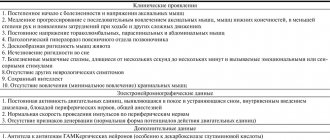Paranoid, who is it? Paranoid personality type, description. Attitude to ideas. Social roles of a paranoid person: leader, subordinate, manager, negotiator.
Hello, friends!
It’s been a long time since we analyzed people’s psychotypes into atoms! It's time to close this gap and return to sorting out the characters of the cute two-legged intelligent representatives of the biosphere of planet Earth!
And today, as the main and only dish, voila, a paranoid (paranoid, paranoid) personality type or simply paranoid!
Of course, one should not confuse the psychotype (character description) with paranoid personality disorder from psychiatry. We won’t talk about crazy people, only about normal ones, like you and me. Although! Who knows where the “exclusion zone” probably is! When I studied psychiatry at medical university, I never received a clear, comprehensive answer on how to separate a patient from a relatively healthy person in everyday communication, without taking an anamnesis.
Maybe this is for the best! Allows you to always be on your toes! Suddenly, opposite you in negotiations is a real psycho, who only looks like an ordinary normal person and has not yet demonstrated the symptoms of his illness. In general, you should be careful!
So, let's go!
Block 1. Paranoid. Personality characteristics.
1.1. Paranoid and self-esteem.
Paranoid people have a strong nervous system. They have high energy potential and excellent performance. Paranoid people have high self-esteem. These people are convinced of their superiority over others, even if they are several steps lower in the vertical social hierarchy.
The suspicion of paranoids is already a byword, who hasn’t heard about it? And yet we will point this out. If those around you do not agree with the superiority of the paranoid person, then the latter will soon come up with a conspiracy theory of the type:
“I was not appreciated because they are jealous, they want to deliberately belittle, steal and appropriate my achievements, they want to harm me, etc.”
After this, the paranoid is ready to get even with the “enemies” of his “achievements” in the mental, legal, and physical space.
Pathological litigious people who love to endlessly sue everyone and always are often paranoid!
Unlike an epileptoid, a paranoid person knows how to forgive in order to convert the “lost” and expand his influence.
1.2. Paranoid is a practitioner.
Paranoids like to call themselves “practitioners.” A “theorist” in their understanding is a second-class creature, incapable of understanding real life, much less achieving a significant result in it! Since the vast majority of so-called “practitioners” tend to look at the world from one angle, or at most from two, the wealth of variations in events for them looks like people’s inability to solve problems, but not as subordination to mathematical laws, in particular the theory of probability.
- If the bridge collapsed, then the engineers are definitely to blame; they should be jailed for 20 years!
- If a war breaks out, then it is definitely the president’s fault, destroy him!
- If a person died in a hospital, then the doctors are clearly to blame; they should deprive them of their license and sue them!
And such single-variant conclusions are drawn in most cases! Such one-sidedness and mathematical illiteracy in thinking sometimes creates great difficulties both for the paranoid person himself and for the people involved in business, labor, professional, and personal relationships with him! And if difficulties for a paranoid person are just another challenge that needs to be overcome, then for those around them this may even be the last point of their own lives due to a heart attack!
1.3. Paranoid and over-ideas.
Paranoid people sometimes get stuck on a certain idea, which becomes overvalued and is experienced as a supreme necessity. The idea turns into a super goal for which they are ready to work for days. These are definitely goal-oriented people! Hence the ambition in his endeavors.
The role of a transformer, an innovator - this is about them.
Thousands of applications for perpetual motion machines are submitted to patent offices around the world every year. Paranoid inventors are convinced of their brilliant discovery, but, alas! “Which of them is guilty and who is right is not for us to judge;
But the cart is still there.” If you remember the catchphrase of Ivan Krylov. The downside of such innovation is ignoring fairly simple verification tests, perhaps because “well, I really, really want to.” Paranoid people can be intolerant of alternative ideas and show intolerance. Which, of course, can cause serious harm even to their favorite business.
A paranoid researcher sometimes forgets that he lives in a family and has different social roles, and with them, obligations when he is “digging for science.”
Forgetting about food, about turning off the stove or turning off the tap water is normal if a paranoid person is now thinking about how to improve the titan lumberjack population.
Basic Concepts
The emergence of the corresponding personality type leads to paranoid disorder and psychosis. People with a similar mental type transfer negative aspects to the outside world, starting to fight them, presenting them as a threat. Sometimes such behavior of a paranoid person is expressed within normal limits, that is, the person is simply suspicious and prefers to be the first to attack before others do it themselves. But very often this condition turns into serious paranoia, degenerating into a psychiatric diagnosis.
Among politicians there are a lot of people with the described mental type, because this is precisely the area in which one can fight what is evil in the minds of such a person. As practice shows, it is the paranoid personality type that most often finds itself in situations of persecution. We can say that their distrust and suspicion seem to attract such troubles.
Block 2. Paranoid and work.
2.1. A paranoid leader.
A paranoid person loves his business (hobby, work, passion) and devotes a lot of time to it. Perhaps it is a favorite activity that becomes a cult in life. The main social role of paranoids is “ Superhero ”. Such people do not just want to control the process, as epileptoids do, in order to reduce anxiety. For paranoids, control is important as part of the implementation of their project.
Paranoids have strong leadership qualities, which are formed in the process of implementing a super idea. This is their principle!
“It’s important to unite people around an idea to make things move!”
The ability to find yourself on the top floor of power is determined, among other things, by the ability to be understandable to broad layers of the population. This means that the words and phrases of the paranoid turn into simple and emotionally charged slogans that resonate in the hearts of the masses!
2.2. Paranoid subordinate.
Paranoid - a subordinate is a responsible person you can rely on! True, there is a circumstance that must be taken into account. If a paranoid person does not agree with how a job should be done, then he will do it as he thinks is right. In this regard, a paranoid person is not a convenient performer, because surprises can be expected from him. A paranoid person has almost no problems with technical tasks.
“In my professional career, when I was a top manager of a company, a cleaning lady came to my office every morning. It all started with the fact that I had to leave my work chair, because she considered it necessary to wipe the dust off my desk so that nothing would distract her from this important process.
Then she sprayed from different cans onto tables, monitors, window sills, paintings, and other furniture for a better gloss effect, intensively polishing and wiping the objects. The washing of the floors was carried out strictly according to plan, with different rags and very carefully, which caused me misunderstanding (why wash the floors so insistently if during the day a crowd of people will pass through my office and within an hour everything will be dirty again).
In the process of cleaning it, I had to change my location at least 3 times (the office was large). At the same time, since it was morning, I had to intensively resolve work issues in the place and position where I found myself at the request of the cleaning lady.
Her approach as a performer, on the one hand, pleased me, and on the other hand, alarmed me with its “stone necessity.” It turned out that it was not the cleaning lady who was needed to keep things clean, but the office, together with the director, had to comply with the cleaning lady’s plan for cleaning things up.
A month later, I gave up, and we hired another cleaner who was not paranoid, did her job less carefully, much faster, and was silent, she was almost invisible, which was psychologically comfortable for me.”
2.3. Paranoid leader.
A paranoid leader is not inclined to individualize and psychologize relationships with subordinates. If you, for example, the head of the personnel service, start telling the paranoid director about the need to create comfortable conditions for employees from the purchasing department, you will look inadequate and get this answer.
– What are the comfortable conditions? Let them first do their job in such a way that no questions arise! Do you want their chairs to be replaced with armchairs? What are we even talking about! Let them first keep these chairs instead of the workplace! That’s not what you’re talking about, Anastasia Petrovna! Better suggest me ways to get them to work for free for an extra hour after working hours!
Employees are work resources first and foremost, and the paranoid views them as individuals in an application to the case. If the subordinate completed the assigned task, then it means the right person, in other words. paranoid. If an employee fails, then he must be replaced with someone who will do everything right. Digging deeply into people, understanding their motives, understanding their value system, being empathetic - this is all secondary and not important for a paranoid person.
“It is not a person who decorates a place and a business, but a business and a place that decorates a person!”
This is the principle of paranoia!
Classification
Patients are classified depending on what super-valuable ideas they are prone to.
There are four types of people:
- fanatics;
- inventors;
- jealous people;
- Querulants.
Of course, this classification can hardly be called truly scientific: it is not capable of reflecting the structure of a personality disorder, based only on the characteristics of highly valuable ideas.
Popular options
Psychiatrists distinguish two main types of paranoid disorder:
- Expansive paranoid personality disorder (strong, highly active, prone to irritability and litigious behavior).
Among such individuals there are often pathological jealous people, people prone to litigiousness and truth-seeking, as well as convinced reformers.Expansive paranoids often send complaints to various authorities, are known for their deceit, and take cruel revenge on their offenders. Noting numerous shortcomings in others, they do not recognize them in themselves. They are always satisfied with themselves, ignore their mistakes and are confident that they have mastered their chosen specialty better than anyone else.
Such people are not inclined to submit; they actively fight against numerous imaginary enemies, which naturally interferes with teamwork. The life of expansive paranoids is filled with self-affirmation and tireless aggressive struggle against “opponents.”
Such people have a strong type of nervous system; the pace of their mental processes is increased. They are very energetic, even fussy, rarely get tired and do not need long-term rest. This group also includes fanatics, that is, people who completely devote their lives to a specific cause, subordinating all their interests and time to it.
At the same time, the fanatic is so obsessed with his super-valuable idea that he is inclined to “infect” those around him with it. This refers to blind fanaticism, that is, the idea that the fanatic serves does not require logical support. Sometimes it may seem that such individuals are prone to altruistic behavior, but this is not so: behind the mask of love for others and selfless service lie callousness, cruelty and selfishness.
- Sensitive paranoid personality disorder (an individual prone to secrecy and passivity, touchy, weak).
Such people surprisingly combine two contradictory tendencies. On the one hand, they are very sensitive and shy, feel inferior, and constantly doubt their own abilities. At the same time, a sensitive individual is extremely ambitious and has a developed sense of self-esteem.Such people are at the same time shy and vindictive, fearful and irritable. A sensitive paranoid person is prone to introspection, self-criticism and even some self-deprecation. At the same time, a person constantly feels insufficiently competent in his chosen field of activity.
Sometimes paranoid character accentuation goes into the stage of decompensation. At the same time, super-valuable ideas are replaced by delusions, that is, false beliefs in which a person cannot be dissuaded by any effort. On the basis of paranoid accentuation of character, psychopathic disorders develop with predominant litigious or hypochondriacal delusions, as well as delusions of jealousy or persecution. If a person experiences these types of symptoms, they need psychiatric treatment.
Block 3. Paranoid and negotiations.
Paranoid negotiators are capable of achieving serious results:
- Get a loan from a bank with a negative credit history.
- Carry out a merger of two joint stock companies.
- Obtain permission from the authorities to build a pavilion.
- Launch a new product line online.
You can do all this, even if during the execution you have to “shoot a couple of strangers and even your own.”
The strength of paranoids is not their ability to masterfully negotiate. This is not discussed at all, since cognitive and verbal flexibility is not about them. And conducting flexible negotiations is perceived by paranoids as a game for weaklings.
They achieve their goal with heavy artillery for many hours, when the targets lose the ability to resist after exhausting battles, and in other cases after expensive and valuable bonuses, cashbacks, kickbacks.
Paranoids are stubborn and even stubborn when it comes to defending their position. If you have to negotiate with such a person, then this attempt will be crowned with success if your positions coincide. In this case, you will have to shift your position so that it coincides with the initial position of the paranoid. But shifting the paranoid position by appealing to the fact that you are also making concessions is doomed! According to your opponent, you are obliged to adapt to him, because he is right, right again, right again, because he is a practitioner, because this is an objective reality, because it is true, which means power is on his side! In general, you are obliged to play by his rules from the point of view. paranoid.
Of course, this approach only emphasizes the negotiating incompetence of paranoids.
So what to do? How to deal with an inflexible self-interested person?
The fact is that paranoids respect others like them, i.e. paranoid. Therefore, even if you are not paranoid, start acting like one with them, while demonstrating commitment to the core idea and value of your opponent. Negotiations in this case are conducted from the opponent’s goal and lead to actions that will achieve the paranoid’s goal, and of course, your own. This is difficult to do because it will require developing a negotiation strategy and patience for a complex of meetings in different social contexts. But it's okay! I can help you with this!
Details about the service “Negotiations – Mediation”
ORDER training
WATCH THE VIDEO “Negotiations. How to establish control over the boss?!”
Responsive WordPress Gallery Plugin
Diagnostics
Patients can be diagnosed based on their symptoms. If there is a tendency to maladaptive behavior and stereotypes that do not correspond to social norms, as well as excessive suspiciousness, there is every reason to suspect paranoid psychopathy.
The doctor should pay attention to the manifestations of a personality disorder that affect all areas of the patient’s life. These may be disturbances in the emotional and cognitive spheres, as well as loss of control over one’s impulses. It is important to carry out a differential diagnosis and exclude paranoid psychosis, schizophrenia and delusional disorder. It is necessary to find out whether the symptoms are caused by alcohol or drug use.
Sources
- A. B. Smulevich. Borderline mental disorders // Guide to psychiatry / ed. Tiganova A.S. - M.: Medicine. 1999.
- Katernaya Yulia Evgenievna Paranoid, schizoid and hysterical personality disorders among adolescents who have not previously sought psychiatric help // Medical almanac. 2015. No. 4 (39).
- Gorinov Viktor Vasilievich Personality disorders in adulthood and old age: on the issue of the outcome of personality pathology (analytical review) // Russian Psychiatric Journal. 2009. No. 5.
- Volodin B.Yu., Sochivko D.V., Yakovlev V.V., Frolov A.I. Current state of the problem of personality disorders // Personality in a changing world: health, adaptation, development. 2021. No. 2.
- A. Skodol. Paranoid personality disorder. 2021.
Low ability to understand others
As part of the description of the paranoid personality type, experts very often describe an iron focus on assigned tasks combined with a low ability to understand others. When these symptoms begin to manifest themselves stably and acquire a total character, causing serious difficulties within the framework of social adaptation, then we are talking about the development of paranoid psychopathy.
Symptoms of a paranoid psychotype
The main sign of a paranoid personality type is groundless suspicion of everything. Such people constantly accuse their lovers of betrayal, doubt the reliability and loyalty of their own friends, and suspect their business partners of betrayal. They perceive any light or sometimes humorous remark as a threat and humiliation. The affective reaction and inadequacy that often accompanies this type of psychosis seems delusional to a normal person.
Sometimes such patients see hallucinations, their associations become loose, their thoughts are blocked, they see a negative and exclusively biased attitude towards themselves in everything. Among the character traits of paranoids, vindictiveness is especially expressed along with dissatisfaction with everything that happens around. Even minor troubles are perceived very painfully by this person. All these symptoms cause the relatives of the paranoid person many problems, expressed in personal relationships, within the framework of general everyday life, and therefore, if these manifestations occur, it is recommended to urgently contact a psychiatrist or psychotherapist for help.
Sociopathic accentuations
The paranoid type of character is classified as sociopathic accentuation. A distinctive feature of this is the increased conflict due to the stubborn desire for innovation. He sees everyone who does not share the views of the paranoid as dishonest and unkind. Such people are also characterized by rigidity in behavior. If the project proposed by this type of personality has caused only indifference or refusal to accept it, they become even more persistent in achieving their own goal.
Defective character trait
A personality disorder, which arises as a result of the development of increasing paranoid symptoms, turns out to be a defective character trait that interferes with normal life and interaction with others. Such people are too selfish, suspicious, they are characterized by rancor, and any actions of their opponents seem to them to be hostile towards them. Because of all this, people with a paranoid type of character find themselves the initiators of all kinds of conflicts; they are always unnecessarily worried about any normal events in their lives.
Reasons for the development of the syndrome
It is difficult to determine any one factor that influenced the development of a paranoid personality type; as a rule, several reasons lead to this. Among them, the following theories are worth highlighting:
- Genetic background. The disorder may be determined by hereditary stimuli, but the stages of adoption of paranoid characteristics from relatives have not yet been studied in detail.
- Conditions of education and life. Paranoid syndrome often manifests itself among people brought up in a dysfunctional family or subjected to harsh educational measures.
- The presence of disappointment in others. In the event that a person is a victim of deception and ridicule of some kind, or has been subjected to intentional harm, especially to his health, then mistrust and suspicion increase significantly, which ultimately leads to mental disorder.
- Physical illness. Atherosclerosis, along with brain damage and syphilis, can significantly influence the development of the corresponding psychosis. Diseases of the digestive system, just like neuroendocrine diseases, in combination with somatic problems can cause the manifestation of this syndrome.









